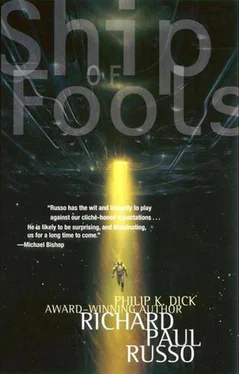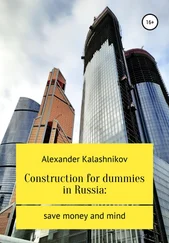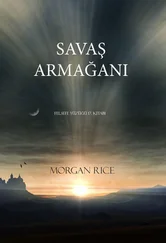I selected simple fare, not much different from what I had been served while imprisoned, and ate quickly. While in my cell, I would often imagine that upon my release I would gorge myself on the widest variety of rich food and drink. Now that I had the opportunity, I felt almost ill at the prospect; eating like that seemed so unnecessary, indulgent, almost immoral.
Nikos was expecting me early that morning. I had agreed to take over the alien ship’s exploration, and he wanted me to help select the new exploration teams and begin as soon as possible, but I needed to see Father Veronica first.
I went to the cathedral, but she wasn’t there. Only Father George was.
I found him at the far end of the cathedral, kneeling at one of the side altars, his head bowed in prayer. The candles flickered, and their dim light fluttered gently about his head. I sat quietly in a pew some distance away and waited for him to finish.
Father George was an old man, stooped and frail. He rose awkwardly to his feet and lit several more of the candles; then he turned to me, and I realized he had heard me come in. He smiled and walked toward me.
“Hello, Bartolomeo.”
“Hello, Father.”
“Prison does not appear to have harmed you much.”
“Mostly my ego,” I said.
Father George chuckled. “Then perhaps you have even benefited from your incarceration.” He tugged at his long white hair with bony fingers, as if his thoughts and vision were in another world, which they probably were.
“In some ways,” I agreed.
“What can I do for you, my son?”
“I’m looking for Father Veronica.”
He nodded to himself as if that was exactly what he had expected. “She’s not here. She hasn’t been here for several days.”
“Where is she?”
“I don’t know. Nobody knows.” He hesitated, studying me. “But when she does return, I will tell her you came to see her.”
“Thank you, Father.”
He looked as if he wanted to say something else, but changed his mind. Instead he just nodded.
I had started down the aisle when he called to me. I turned back to him, and he was standing straighter than I had seen him in years, and his expression was grave.
“What is it, Father?”
“Be careful, Bartolomeo.”
“Of what?”
“Everything.” He paused, then repeated himself. “Everything. But especially of the alien ship.” He shook his head. “It is an evil thing, and it should be left alone. Perhaps it even comes from the Fallen One.”
“Satan?”
“Why not? Is that any more incredible than the notion that the ship is an artifact of an alien civilization?”
I wanted to tell him that I didn’t believe in Satan, or the Fallen One, or whatever he might want to call it, but I didn’t see the purpose. It would be an attack on his faith, and he probably knew how I felt, anyway.
“I’ll be careful,” I told him. “Thanks.” I turned to leave, and saw Nikos waiting for me near the cathedral’s main doors.
“We might have a problem,” he said when I reached him.
He was sweating and smelled faintly of alcohol; I wondered if he had developed a drinking problem while I was imprisoned. If so, I was in more trouble than I had thought.
“What is it?” I asked.
“The bishop has called an emergency session of the Executive Council.”
“The reason?”
Nikos gave me a rueful smile. “You, of course.”
EVERYONEelse was already in the council room when we arrived; conversation died immediately, and the tension level rose like a sudden flush of heat. I noticed one change: Geller sat in General Wainwright’s place.
Nikos and I stood together just inside the door. The bishop watched us, his expression composed, but he could not hide the edge in his voice as he spoke.
“Bartolomeo should not be here. He is the subject of this emergency session.”
“That is exactly why he is here,” Nikos replied. “I’m not certain what the issue is with Bartolomeo, or what suggestions will be made concerning his fate, but he should be here to argue his side.”
“No,” the bishop insisted. “We need to be able to speak frankly and openly. His presence makes that more difficult.”
“I agree with Captain Costa,” Geller said. “Bartolomeo should be allowed to stay, and should be allowed to speak for himself when necessary.”
“If that is a motion,” added Margita Cardenas, “I will second it.”
Everyone waited for Nikos to confirm the motion from Geller, then call for discussion and a vote. But Nikos remained silent, staring back at the bishop.
Bishop Soldano nodded once, and this time when he spoke the edge was gone from his voice; however, it was replaced not by resignation but by the patience of a predator biding its time. “I don’t think a vote is necessary. I defer to my fellow council members. Let the man stay.” He paused. “But I will insist that he sits at the foot of the table, and not in his customary position as Captain Costa’s adviser.”
Nikos took his seat at the head of the table, and I sat at the foot. He formally opened the meeting, but no one spoke for a long time. I felt surprisingly calm. What could they do to me? Imprison me again? That was unlikely, and I knew it.
Finally Nikos turned to the bishop. “Bishop, you called this emergency session. You should begin.”
“I will. That man,” the bishop said as he gestured at me, “has been summarily released along with the other leaders of the mutiny. This was done without any discussion in the council, and without notice.”
“As captain of the Argonos ,” Nikos broke in, “I have the authority to do so.”
“You have the authority to commute sentences, and to issue pardons. Since there were no trials, and no convictions or sentences, there was nothing to commute, and there is some question about whether or not you can pardon someone for offenses they have not yet been convicted of. We have seen no formal records or proceedings, Captain. I ask now that you tell us what you have done, and why.”
Nikos appeared to be self-assured and relaxed. “I have neither commuted any nonexistent sentences, nor have I issued any pardons. The ship registrar has a record of the orders. I simply released Aguilera and the others with Captain’s Directives, pending further proceedings. The charges remain.”
The bishop shrugged, as if he wasn’t completely surprised by the captain’s remarks. “I do not dispute their release,” he said. “I merely wanted to note that I had concerns about the legalities. My primary objection is that you did not consult the council. Assuming you had the authority to take the actions you did, you were not required to consult us. However, I believe that you have an ethical, if not legal, obligation to do so on matters of this importance. We deserve the opportunity to advise, to register objections, to understand your reasoning. And I would like a sense of the council’s thoughts on the matter. I think you should have a sense of the council’s thoughts.”
“You called an emergency session for this?” Nikos asked. “This is not a matter of urgency. It could have waited until our next session, which is only three days from today.”
“There is more,” the bishop said. “A more urgent matter. I understand Bartolomeo is to head a new team on further excursions to the alien vessel.”
There was a long silence. The council members were trying to figure out what, if anything, was to follow. Susanna Hingen was the first to speak, glancing first at me, then turning to Nikos.
“Is that true, Captain?”
“Yes,” Nikos answered. “I don’t see the problem. I have decided to put Bartolomeo in charge. We need a fresh approach, and I believe Bartolomeo is the best person to do that.”
Читать дальше












